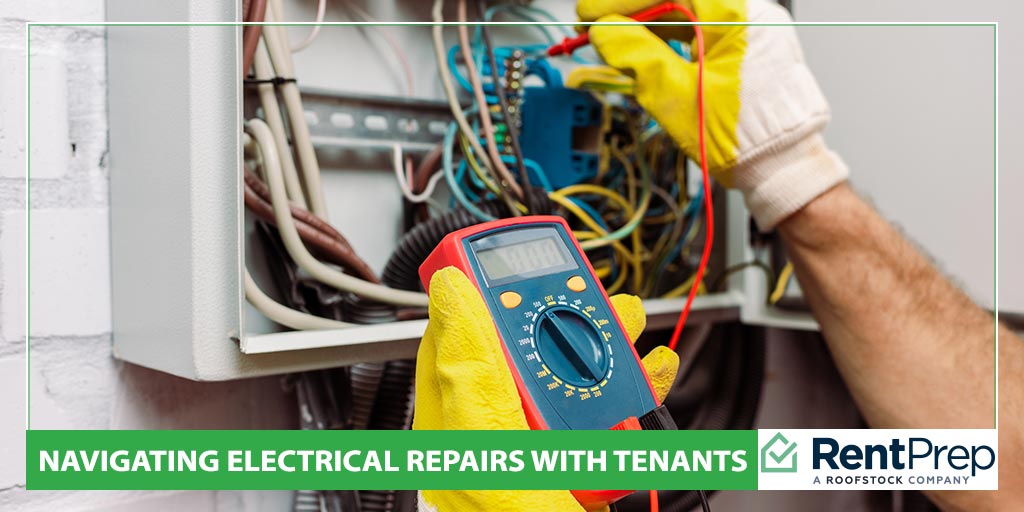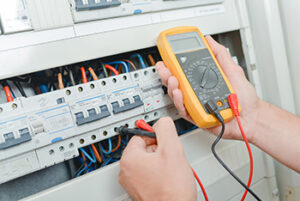
When it comes to maintenance, it seems like landlords and tenants are constantly going back and forth on whose responsibility it is to pay for the repair. Electrical outlets and electrical system issues are often contested, so here’s a quick guide on how you as a landlord can handle the discussion about who is responsible for electrical repairs.
Common Electrical Problems
Electrical problems are common in homes of all types, ages and sizes and rental properties are no different. Common electric problems include dead outlets, faulty light fixtures or nonworking light switches. More serious electrical problems might include sparks at the electrical outlet, heat around the outlets or switches, flickering lights, circuit breaker trips and frequent light bulbs burnout.
There are very few electrical problems that an untrained person should try to fix on their own. Most electric repairs should be done by a licensed, trained professional. However, because electricians are expensive, landlords and tenants often argue on who gets to pay the bill for the repair.
Landlord Responsibilities

It’s a landlord’s responsibility to ensure that a rental property’s electrical system, from outlets to light fixtures, are all operating properly before the tenant takes possession of the unit. A working electrical system is required as a condition of habitability in most state statutes regarding landlord responsibilities. This is because the electrical system is a key factor in working smoke detectors and often for heating systems as well.
If a rental unit is not considered habitable, the landlord faces restrictions on renting and enforcing the lease agreement. Other systems that are mandatory for habitability include plumbing systems and sewage systems.
A working electrical system, including electrical outlets is an essential part of a habitable unit. If for any reason an electrical outlet is not working within a few days or weeks after turnover, the landlord should be responsible for fixing it.
If an electrical outlet seems to stop working for no discernible reason, then it’s the landlord’s responsibility to seek out the problem and arrange for repairs to be made. Because an electric outlet problem can often tied into a greater electric system problem, it’s in the landlord’s best interest to get repairs arranged as soon as possible.
Tenant Responsibilities
A tenant is responsible for repairs to an electrical outlet if it can be shown that the damage was done because of some kind of tenant action. Examples include if the tenant overloads the outlet or a foreign object is inserted into the outlet and creates a short circuit. Causing damage to a wall and subsequently the electrical outlet or wiring would also qualify. Finally, if an outlet or a wall an outlet is on is damaged by water from a tenant’s negligence, the responsibility for electrical repairs would also fall on the tenant.
Time Frame for Repairs

Depending on the impact of a problem with the electrical system, landlords have some flexibility in how long it might take to arrange for a repair. If an electrical outlet is not working, for example, it could simply require a reasonable amount of time until an electrician can be contacted and scheduled to visit the unit. A broken outlet is not an emergency and would not affect the habitability of a rental property.
If the problem is system-wide and prohibits the tenant from using electricity for anything longer than a few hours, it could mean trouble for the landlords. An emergency service person should be called out to make repairs as soon as possible. If the problem cannot be remedied soon, the landlord may be responsible for alternative housing accommodations while the repairs are made.
If the electrical repair is the tenant’s responsibility, the landlord should work with the tenant so schedule repairs as soon as possible. Again, the severity determines the timeframe. Landlords may want to give a deadline to the tenant for small repairs like a broken outlet, such as 30 days. Landlords can also communicate with the tenant as to whether the tenant should arrange for repairs on his own, the landlord arranges the repair and is reimbursed by the tenant, or another solution. If a tenant will not make the repairs in a timely manner, the landlord can deliver a comply or quit notice, and follow through if necessary.
Giving Notice for Inconvenience
Generally, when an electrician needs to work on the electrical system in a home or business, all electrical currents must be shut down for a time. If your electrician will need to have the electricity off for longer than an hour, it’s a good idea to let your tenants know ahead of time so that they can make additional plans. In extreme cases where the power must be cut for more than a day or so, landlords and tenants should work together to ensure that minimal disruption occurs.
Do you have any rules in your lease agreement or maintenance work about electrical systems? If so, how have you handled it effectively?

